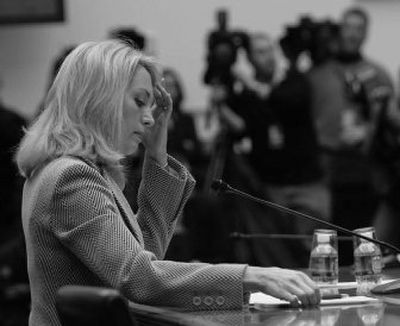Plame offers account to House committee

WASHINGTON – With a phalanx of cameras awaiting her entrance, Valerie Plame stepped out of the shadows of the spy world and into the spotlight.
For nearly four years, Plame had been a silent figure at the center of one of Washington’s most consuming scandals. Her unmasking as a CIA officer became a case study of the brutal politics of the Iraq war and launched a criminal probe that led to the conviction of a top White House official.
On Friday, Plame finally offered her inside account, testifying before a congressional committee that she felt like she had been “hit in the gut” when her once-secret identity appeared in the media and accusing the Bush administration of “recklessly” blowing her cover.
Plame answered lingering questions about her husband’s role in investigating one of the Bush administration’s most alarming prewar claims about Iraq and provided new details on the maneuvering between the White House and the CIA in the run-up to the war.
In her opening statement, Plame made it clear that she has been waiting for a chance to confront critics. At one point she said her identity was not “common knowledge on the Georgetown cocktail circuit,” as some have whispered in Washington in an effort to discount the damage of the disclosure of her identity. She said she has been on secret foreign missions within the past five years and was undercover when her name appeared in a newspaper column in 2003.
Plame also came prepared to settle scores with the Bush administration, which carried out a campaign to discredit her husband, former Ambassador Joseph C. Wilson IV, after he surfaced as a potent critic of the case for war in Iraq.
“We in the CIA always know we might be exposed by foreign enemies,” Plame said. “It was a terrible irony that administration officials were the ones who destroyed my cover.”
Friday’s hearing, held by the House Committee on Oversight and Government Reform, was ostensibly designed to assist lawmakers in drafting improved procedures for safeguarding classified information. But the unacknowledged purpose was to give a platform to someone who had been a mystery figure in a scandal bearing her name.
Rep. Henry Waxman, D-Calif., chairman of the committee, said the panel had negotiated ground rules for the hearing with the CIA to prevent the disclosure of classified information, including details of Plame’s background. As a result, Plame, 43, offered only a general outline of her 20-year career at the agency.
But, for the first time she offered her version of the chronology leading up to the breach.
In early 2002, Plame said she was approached by “a young junior officer” who was “very upset” after getting a phone call from the office of Vice President Dick Cheney asking about a report that Iraq had sought to purchase uranium from the African nation of Niger.
Plame characterized the call as part of a broader effort by Cheney to pressure the CIA, a charge that Cheney, as well as senior CIA officials who were present at the agency at the time, have denied.
“Certainly Vice President Cheney’s unprecedented number of visits to the CIA in the run-up to the war might be one example” of his efforts to pressure analysts, Plame said.
Asked whether that was a form of intimidation, she said, “Yes, it is.”
Bush administration officials later claimed that Plame had proposed sending her husband to Niger to investigate, casting the trip as a boondoggle. But Plame insisted that was not the case.
“No. I did not recommend him, I did not suggest him, there was no nepotism involved,” Plame said.
Wilson traveled to Niger and returned to file a report with the CIA that he found no evidence backing up the uranium claim. Nevertheless, the allegation was included in President Bush’s 2003 State of the Union address.
After the U.S. invasion, when it became evident that Iraq had no banned weapons, Wilson came forward publicly to accuse the White House of twisting the prewar intelligence, prompting a White House campaign to discredit him.
Plame said she was at home when she learned her name had been published in a column by Robert Novak. She said her husband threw a copy of the newspaper on the bed and said, “He did it,” meaning Novak had printed her name.
“I felt like I had been hit in the gut,” she said.